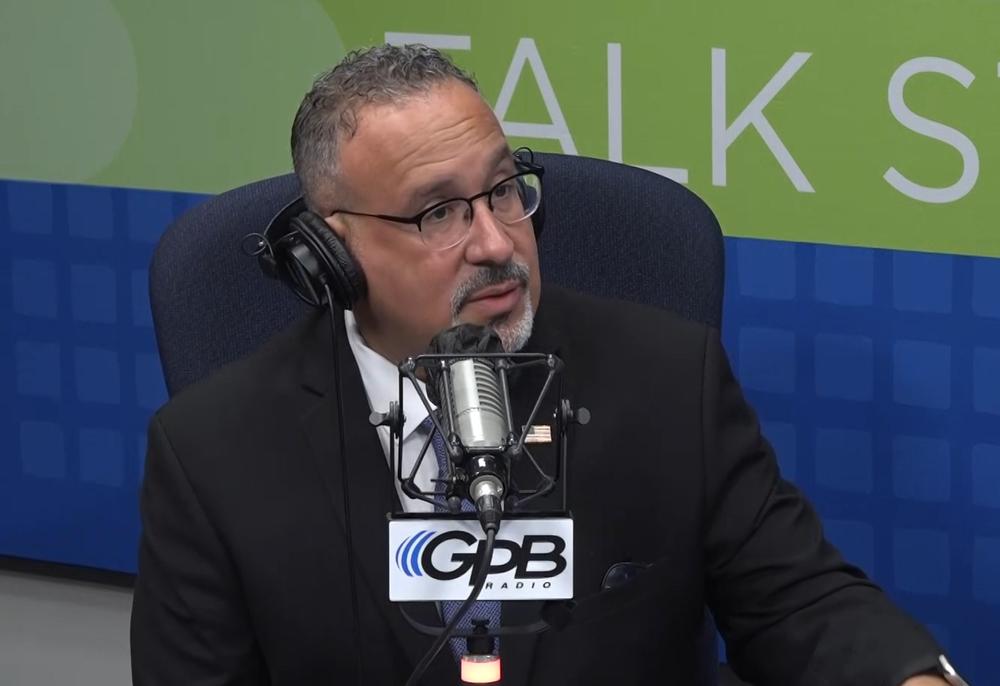
Section Branding
Header Content
Georgia Today: Term extensions for PSC members; Kroger opioid settlement; 'Midnight' musical
Primary Content
LISTEN: On the Wednesday, July 17 edition of Georgia Today: Two groups file a challenge to a new law extending the terms of public service commissioners; some Georgia residents could get a share of Kroger's billion dollar opioid settlement; and an iconic Savannah crime novel is now a musical.

Peter Biello: Welcome to the Georgia Today podcast from GPB News. Today is Wednesday, July 17. I'm Peter Biello. On today's episode, two groups file a challenge to a new law extending the terms of public service commissioners. Some Georgia residents could get a share of Kroger's billion dollar opioid settlement; and an iconic Savannah crime novel is now a musical. These stories and more are coming up on this edition of Georgia Today.
Story 1:
Peter Biello: Two groups, including Georgia Power customers and conservationists, filed a lawsuit today trying to overturn a new law that extends the terms of state public service commissioners. GPB's Sarah Kallis has more.
Sarah Kallis: House Bill 1312, which goes into effect this year, gives commissioners two additional years in office. The state constitution mandates six-year terms, but the new law means some PSC members will serve up to eight. PSC elections have been delayed due to a redistricting issue. Brionte McCorkle, the executive director of Georgia Conservation Voters Education Fund, says that citizens should get to choose commissioners who make decisions on Georgia power rates.
Brionte McCorkle: People deserve fair representation and meaningful inclusion in the decisions that are impacting their lives. This power grab in postponing elections is, is just — is not what democracy is supposed to look like.
Sarah Kallis: Under the new law, commissioners will eventually revert back to their six-year terms. For GPB News, I'm Sarah Kallis in Atlanta.

Story 2:
Peter Biello: Some Georgia counties are being invited to get their share of Kroger's $1.2 billion multistate settlement over the franchise's participation in the opioid addiction crisis. GPB's Sofi Gratas has more from Macon, which plans to participate.
Sofi Gratas: On Tuesday, the Macon-Bibb County mayor and commission said they intend to request some portion of money from the settlement. Of the roughly $74 million set aside for Georgia in total, Macon-Bibb could get at least $1 million over 11 years if all 33 states and their districts in the settlement also request funds. But as County Attorney Michael McNeil explains, each plaintiff must agree to the terms with a deadline in mid-August.
Michael McNeil: Sort of like a grant program, it has to be used in ways that mitigate the effects of the opioid epidemic. Things like buying naloxone or training people on responding to opioid overdoses or things like that.
Sofi Gratas: That's how the other settlements have worked, too. So far, Cobb County is the only other county reported to be signing the agreement. For GPB News, I'm Sofi Gratas.
Story 3:
Peter Biello: Two days after the judge overseeing the racketeering and gang prosecution trial against Atlanta rapper Young Thug was removed from the case, his replacement has recused herself. Judge Shakira Ingram said today one of her former deputies had a romantic relationship with a codefendant that could create an appearance of impropriety. A third judge now will be assigned to the trial, the longest in Georgia history.
Story 4:
Peter Biello: Georgia students continue to struggle with reading in the wake of the COVID-19 pandemic. Experts and policymakers will gather this week to discuss the issue at the governors annual Summit on Early Language and literacy. GPB's Mira Donaldson has more.
Mira Donaldson: Before the pandemic, Georgia state Milestones data showed that 73% of third graders were proficient in reading. As of last year, that number was 66%. And while that's an improvement over 2022, COVID learning loss continues to impact Georgia's students. Scott Johnson is chairman of Georgia's Council on Literacy.
Scott Johnson: You know, if you want to go by the nation's report card, the average third grader going into fourth grade is not reading proficiently. I like to say it is Georgia's most solvable problem.
Mira Donaldson: And he says that is important because difficulty in reading as an adult can impact accessibility in education, health care, or the job market. The conference takes place today and tomorrow at Georgia College and State University in Milledgeville. For GPB News, I'm Mira Donaldson.
Story 5:
Peter Biello: Emory University Hospital and Emory Saint Joseph, both in Atlanta, are Georgia's top two hospitals. That's according to new rankings from U.S. News and World Report. Emory University Hospital was also nationally ranked for their cancer care. For the first time, U.S. News ranked hospitals on their work caring for patients and underserved communities. Atlanta's Grady Hospital received top honors in that category. Min Hee Seo is the health data scientist with U.S. News.
Min Hee Seo: This means that Grady Memorial Hospitals were either serving many patients from underserved communities or serving patients with a low income or either they're racial or ethnic minorities.
Peter Biello: Seo says 172 Georgia hospitals met ranking standards.

Story 6:
Peter Biello: One of the two new nuclear reactors at Georgia Power's Plant Vogtle has been shut down for more than a week due to a valve issue. The Atlanta-based utility said yesterday operators on Unit 3 shut down the reactor on July 8 because of lowering water levels in steam generators, caused by a problem with a valve on one of the pumps. Georgia Power didn't say when Unit 3 will be returned to service. Units 3 and 4 at the plant outside Augusta were the first nuclear reactor built in the U.S. in decades. Unit 3 went into commercial operation last July.
Story 7:
Peter Biello: Midnight in the Garden of Good and Evil is now a musical. John Berendt's 1994 true crime nonfiction book set in Savannah, stayed on the New York Times bestseller list for 216 weeks, becoming a favorite among readers. So will the stage adaptation be a hit with theatergoers? GPB's Savannah reporter Benjamin Payne says yes, but that it has room for improvement. He attended opening night in Chicago and has this review.
Benjamin Payne: Outside the Goodman Theater, you see trains passing overhead and skyscrapers towering from on high. But inside the venue it's Savannah. Spanish moss dangles from live oak tree branches high above the stage, Gothic statues of angels evoke Savannah's Bonaventure Cemetery and the soothing buzz of cicadas reverberates throughout the Goodman's 800-plus-seat mainstage theater. The show opens at Bonaventure with voodoo priestess Minerva chanting somber spells to summon African spirits from the grave. This solemn scene stands in stark contrast to most of the rest of the musical. It turns out this show, about a fatal shooting, is lighthearted above all else. It's a love letter to....
MUSIC: "Savannah! Sweet Savannah! ... A town we all take pride in. But I know what they're hiding!"
Benjamin Payne: The musical's main focus is not on Jim Williams. The wealthy socialite and antiques dealer fatally shot his much younger lover, Danny Hansford. Instead, the star of the show is the Lady Chablis, a Black transgender nightclub performer played masterfully by J. Harrison Ghee. Last year, Ghee became the first openly nonbinary person to win the Tony Award for Best Leading Actor in a musical. It's easy to see and hear why in their portrayal of Chablis.
Ghee looks and sounds almost exactly like the real Lady Chablis, who played herself in the 1997 film adaptation. Author John Berendt, who was friends with Chablis, says the resemblance is uncanny.
John Berendt: So much like Chablis was that it gave me goosebumps. She commanded a room just the way J. did last night.
Benjamin Payne: Unlike the book in the movie, the musical doesn't feature an author character. Instead, the audience is addressed as the author, giving the cast a clever way to break the fourth wall and play with theatergoers. It's a wise move to leave Berendt out, since in the book he's a largely impartial narrator with little to lose, unlike Jim Williams, who's on trial for murder. Williams is played by Broadway actor Tom Hewitt, who puts on a fun Southern accent without overdoing it. Here he is scolding his employee, lover and ultimately shooting victim Danny Hansford, restoring a chandelier.
Tom Hewitt: You put these on the wrong way.
Danny Hansford: F*** no I didn't.
Tom Hewitt: The prisms are facing in. They need to face out to reflect the light.
Danny Hansford: You just tell me now.
Tom Hewitt: You'll have to take each one off and start from scratch.
Benjamin Payne: And staying true to its name, Midnight in the Garden of Good and Evil does indeed include a midnight scene, with Minerva helping Williams practice voodoo at a cemetery to help his odds with the jury.
MUSIC: "Oh the spirits look down favorably. The spirits look down generously. In the half hour before midnight comes, it's time for doing good.
Tom Hewitt: What happens after midnight?
Minerva: Other tings.
Benjamin Payne: Unfortunately, there are no scenes from any of the four murder trials. The mystery of whether Williams killed Hansford out of self-defense or out of cold blood is ignored. The shooting is cleverly hidden from the audience's view by framed paintings in Williams house, but a courtroom drama never comes. This is the show's biggest weak point. The music and vocal performances, though, are phenomenal. When the production was first under development several years ago, the producer's original plan was to feature only music by Savannah native Johnny Mercer. He's mentioned frequently throughout the book, and his great-grandfather built the Mercer Williams house in which the shooting takes place. Instead, the roughly 20 songs in the musical are all original, written by Tony Award winner Jason Robert Brown. Here's Emma Dawes, a high society rival of Jim Williams. She's played by Sierra Boggess, a Broadway actress who previously performed in The Phantom of the Opera.
(MUSIC) Emma Dawes: "Once that monster's put in jail. It's hard for me to prevail. To say to the world, we banish from this idyllic spot. Debauchery, debasement, and moral rot!
Benjamin Payne: Many of the numbers are sung captivatingly by J. Harrison Ghee as The Lady Chablis. Throughout the show, Chablis is told to rein it in, to dial it down, but she proudly defies those edicts. And so the musical's takeaway message is to stay true to yourself. That might sound trite, but Chablis' experience as a Black trans performer in the Deep South 40 years ago is still timely. In Georgia this year, Republicans introduced a bill that would have removed hate crime protections for LGBTQ Georgians. It's just one example of new attempts by state governments to restrict rights for gender nonconforming people. As a nonbinary person who grew up in North Carolina. J Harrison Ghee says the show has a lot to say about the South.
J. Harrison Ghee: It says that there's a lot of history there, and it says that there's a lot of opportunity to grow and to expand. And that's what excited me about this story and opportunity from growing up in the South to show not only the South, but the world, that we have a long way to go to be free and to live in joy and safety.
Benjamin Payne: Ghee's performance as The Lady Chablis is worth the price of admission alone. Midnight in the Garden of Good and Evil runs through August 11 at Chicago's Goodman Theater. But that may not be your only chance to see the show. Producers are in talks to bring the musical to Broadway — and to Savannah. For GPB News, I'm Benjamin Payne in Chicago.
MUSIC: "I say to my sisters and brothers and others, no matter what you are. When the powers that be..."
Story 8:
Peter Biello: One of Georgia's newest entertainment venues, has announced its inaugural performing artist. The Classic Center Arena in Athens said Monday that one of the city's legendary bands, The B-52s, will be the first to perform at the venue on Dec. 14. Tickets go on sale Friday. The $151 million arena is still under construction, and it's now set to open after a series of setbacks.

Story 9:
Peter Biello: U.S. Secretary of Education Miguel Cardona is in Atlanta today meeting with the heads of several of the state's historically black colleges and universities. He'll also be speaking with students who've recently benefited from debt relief from the Biden administration, and meeting with others to learn more about how to support women of color and higher education. Secretary Cardona is here at GPB Studios with me now. Welcome, Secretary.
Miguel Cardona: Thank you. Great to be here.
Peter Biello: So let's talk a little bit first about what brought you to Atlanta here today. The Biden administration in May announced $16 billion in funding for HBCUs. So a two part question for you. What's this money going to pay for? And ultimately, is it enough?
Miguel Cardona: Let me start with the second part. You know, for decades, HBCUs have been underfunded. We are working to not only, at the federal level, make sure that we're providing a level playing field for infrastructure work, for example, but we're also communicating with governors about the obligation under the Morrill Act, for example, of funding HBCUs adequately. So that's something that we're bringing attention to. An example of what we're trying to make sure that HBCUs have access to is funding for infrastructure, which is what we're visiting today. We're going to be visiting a science lab there that can help women at the college prepare for the careers in STEM that we know are going to be more prevalent given the Chips and Science Act [and] the energy provisions under the Inflation Reduction Act. So it's good to see, at Spelman [College], that they have programs that are going to prepare their students for these careers.
Peter Biello: So let's talk a little bit about the debt relief, because you'll be meeting with some beneficiaries of that policy. This is a major cornerstone of the Biden administration. But let's also talk about the other part of that, which is tuition. Tuition is high. And it rose here over the past year in Georgia. It's rising nationally. What can your department or the Biden administration do to work that side of the equation and keep tuition down?
Miguel Cardona: Yeah, that's a great question. And it's really important for me to share that debt relief, while it gets a lot of attention, is only a piece of the puzzle, right? The president asked me to work to make higher education more affordable and more accessible. Student debt relief is a part of that. We've also introduced the most affordable income-driven repayment plan, called the Safe Plan, that makes it less likely for borrowers to go into default. Now you bring up rising tuition and the cost. Well, in addition to increasing Pell Grants for students who have economic need, we're also introducing the gainful employment rules that require universities and institutions of higher education to communicate the return on investment. Basically, the debt-to-earnings ratio of the graduates of the school. So parents and students can make informed decisions on whether it's a value to go to this college. So we are taking steps to make sure that we're improving the value of college, providing more options for students — also, options that don't necessarily include a four-year degree, although we do see the benefits of four-year degrees and we want to make sure more students have access to that. We also know that students could be gainfully employed and doing exceptionally well through different pathway opportunities that we're also promoting in the Biden-Harris administration.
Peter Biello: There was one instance in Georgia where a teacher lost her job for having taught to her fifth graders a book about gender fluidity. Now this is part of the larger cultural issues in schools, not just in Georgia, but across the country. I don't need you to weigh in on that particular Georgia case, but generally speaking, what can your department do to ensure that — that teachers are teaching what they feel their students need without influence from politicians or activists?
Miguel Cardona: It's unfortunate that there's been so much more political interference in education, an area that was once not disturbed by the — by the partisanship. And unfortunately, in our country, we're seeing politics spill into the classroom. Look, we talk about a teacher shortage. In Georgia, for example, teachers start at a salary of $41,000. Look, if we're serious about investing in our students, we have to make sure public education thrives, that we respect educators like professionals, and that we give them the agency, the better working conditions, a competitive salary to have their students thrive and be successful. Now, I don't want to speak specifically on that case. And I do believe decisions have to be made locally. And quite frankly, I do believe that culture wars are being thrust into our schools to create division with a bigger goal by Republicans to destroy public education. I'm going to be very frank about that. And you could see in Project 2025, it's not even a rumor anymore. This is what they're trying to do. And what will end up happening is not only will the profession become less desirable, but public schools, you'll see a bigger gap between the private institutions and the public education that educates the large majority of students in this country.
Peter Biello: A gap in outcome, you mean?
Miguel Cardona: A gap in services, a gap in outcomes. You know, when you have a system that separates students based on wealth and ... who can push the hardest? You can have limited spaces for students in schools that are more privileged, and then the public schools are going to be less funded and they're going to have more need. So I see this as a catastrophe to public education, marginalizing students who already feel marginalized in their schools. So we have to really pay attention and make sure that we protect public education.
Peter Biello: You were a teacher decades ago. You were also an administrator at schools in Connecticut.
Miguel Cardona: I was.
Peter Biello: What would you want to hear from someone in your position if you were a teacher? You've occupied that perspective. What would you want to hear, given the current climate for teachers now?
Miguel Cardona: Once a teacher, always a teacher. I taught fourth grade. I was a school principal for 10 years. They need us now more than ever. Our kids, our communities, our families need us now more than ever. We have to protect public education, ensuring that all students feel welcome in our schools, even if some states have laws against students that are maybe gay, or come from a different background. We see DEI [programs] under attack everywhere. So they need us now more than ever. And that in the Biden-Harris administration, we're fighting like hell to respect the profession. Whatever we can do at the federal level, we're going to do.
Peter Biello: You mentioned Project 2025. So I wanted to ask you about conservative goals more broadly to eliminate your department. What, in your view, would that mean on the ground for people in Georgia? In other words, what would Georgians notice about their public schools if that were to come to pass?
Miguel Cardona: Yeah, this was the plan before with Betsy DeVos. We came in and we interrupted that. So make no mistake, this was the plan from before. What parents will see is less special education services, less reading support for students that receive Title I supports — or schools that receive Title I supports. You'll see tuition money being taken from the public school accounts, and many of our schools already are underfunded and they don't have the resources, so we will see less. So when those teachers start at $41,000 a year, it could be that you don't have enough teachers and you'll have more substitute teachers in your schools. So you have students who are maybe not reading at grade level, because I'm looking at the Georgia data and they're — they're about 29th in the country, 30th in the country in terms of some of the reading achievement. You need more, not less. Privatizing these dollars would make it a competitive thing. And do you think these private institutions that are getting tuition money with these vouchers, do you think they're going to want to invest in students that are more expensive to educate because they may have a reading disability or they have a disability that costs more to have more staffing? Or do you think those institutions would rather those students stay in the public schools? We're creating a system of haves and have nots. Public education is under attack, and we're going to fight like hell to make sure that we're protecting this institution that allowed me, a kid — a first generation kid — in a high-poverty district, now serving as Secretary of Education, advising the president of the United States. That's the power of public education. It's under attack. We need to stand up.
Peter Biello: Well, Secretary of Education Miguel Cardona, thank you so much for coming into GPB Studios today and speaking with me.
Miguel Cardona: Of course. Great to be with you. Thanks.
Story 10:
Peter Biello: In sports, the Atlanta Braves wrapped up this year's first year player draft, having drafted 11 pitchers, six outfielders, two infielders and one catcher. Eleven of those played for Division I schools, two for Division II schools, one junior college player, and six high schoolers. The All-Star break continues through tomorrow. Then the Braves begin a three-game home series against the Saint Louis Cardinals on Friday. And in basketball, the Atlanta Dream lost to the Minnesota Lynx this afternoon, 86 to 79.

Story 11:
Peter Biello: One more story to note before we wrap up for the day: A story that might make you pump the brakes a little bit if you are driving. Highway safety officials in five Southern states, including Georgia, have begun a speeding awareness and enforcement campaign called Operation Southern Slowdown. Now in its eighth year, the weeklong show of force on interstates and state highways could land speeding drivers tickets.
All right, we are done for the day. Thanks for listening to Georgia Today. We do appreciate it. We'll be back tomorrow with all the latest news. The best thing to do right now is to subscribe to this podcast. That way we will pop up automatically in your feed tomorrow with all the latest headlines. And if you've got some feedback for us or a story idea, send it to us by email. The address is GeorgiaToday@GPB.org. And if you want to learn more about anything you heard on the podcast today — if you want to see a video of my conversation with Secretary Miguel Cardona — you can find that at GPB.org/news. I'm Peter Biello. Thank you so much for listening. We'll see you tomorrow.
---
For more on these stories and more, go to GPB.org/news



